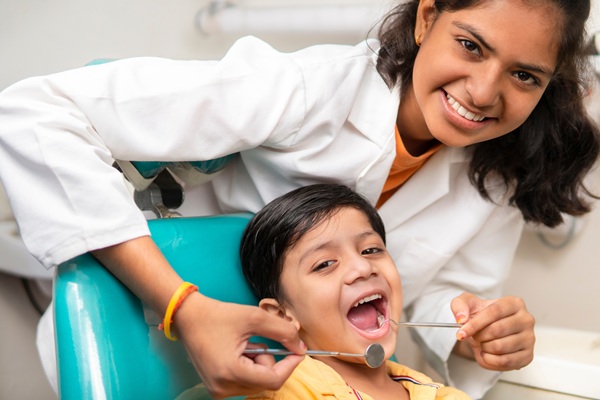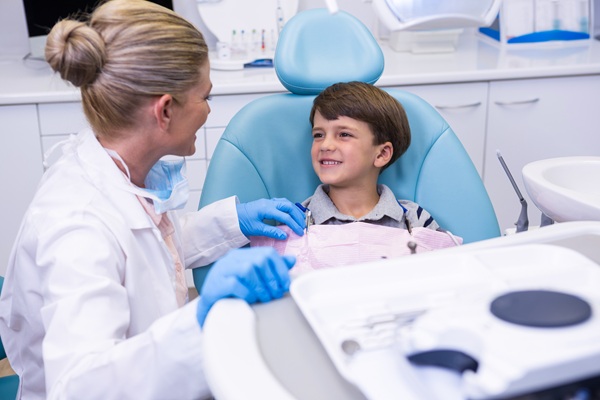Why a Kid Friendly Dentist in Dumont Discourages Thumb Sucking

A kid-friendly dentist in Dumont may tell parents during dental appointments to stop children from sucking their thumbs, and with good reason. Children tend to suck their fingers and toes to soothe themselves. It is also called non-nutritive sucking. Continue reading to find out why a kid-friendly dentist discourages this habit.
What is thumb sucking?
Almost all newborn babies suck their thumb or one of their fingers after birth. It is harmless and one of the most common habits among children all over the world. The practice is normal when the child is still under four years, but it is a problem if the child does not stop the habit after turning five.
Experts think thumb sucking is a natural response in toddlers and infants, which serves as a coping mechanism for anxiety. Babies feel happy, comfortable and secure when sucking their fingers. Surprisingly, this habit often begins from inside the womb.
Why thumb sucking is bad
The kid-friendly dentist will advise parents to discourage their kids from the habit once the child is four years old. Thumb sucking beyond this age can have an adverse effect on their oral health. It can cause teeth misalignment, bite problems due to issues with the roof of the mouth and problems with mouth and jaw formation. Parents may struggle to wean their child off of the act, often preferring to ignore them instead. Eventually, a dentist’s intervention might be the only way to stop them.
The pressure created by sucking may start to produce harmful effects on the child’s teeth at age five or six. The teeth in the front row may jut out, and the upper and lower front teeth will stop meeting, leading to incorrect or open bite. If neglected, these changes may usher in teeth alignment issues when the permanent teeth start coming in.
To prevent improper jaw formation, bite misalignment in younger children needs prompt evaluation by a kid-friendly dentist. The bite problem is easier to correct if intervention occurs at an early age. In severe cases, kid-friendly dentists may suggest fitting a dental appliance like a crib over the roof of the mouth to discourage the child from sucking their fingers.
Unfortunately, many parents are not aware of the harmful effects of thumb sucking. Aside from misaligned teeth, malformed mouth roofs, overbite, misaligned jaw and challenges with pronunciation are some of the issues caused by thumb sucking in children. It has lifelong effects on a child who continues with the habit after turning five. Correcting the problem requires costly dental procedures, oftentimes including orthodontic treatment.
Getting rid of the habit
Many children can control their impulse to suck on their thumb once they learn of the harmful effects. Breaking habits is tough, though. Parents can provide positive reinforcements and reward the child when they do not suck their fingers. They also need to observe the child and identify the triggers. It will be a lot easier to stop once they address the underlying cause of the habit. With the help of a kid-friendly dentist, the habit can be put to a halt.
In conclusion
If a child is struggling with thumb sucking, it is important to take proactive measures to stop the habit. Parents can also ask a kid-friendly dentist for advice.
Request an appointment here: https://novapedsdentistry.com or call Nova Pediatric Dentistry at (201) 812-2952 for an appointment in our Dumont office.
Check out what others are saying about our services on Yelp: Read our Yelp reviews.
Recent Posts
Composite fillings are a popular choice for treating cavities in children's teeth. These fillings consist of tooth-colored resin that blends seamlessly with natural teeth, making them an ideal option for those who want both functional and aesthetic solutions. Composite fillings are especially beneficial for children as they offer a durable, effective, and visually appealing way…
A kid friendly dentist understands the importance of creating a welcoming and comfortable environment tailored to young patients' needs to help alleviate the child's stress or anxiety. Establishing positive dental experiences early on is not just about the present, but it also ensures children develop healthy oral hygiene habits that last a lifetime. Learn the…
Infants can benefit from seeing a pediatric dentist when primary teeth begin to erupt. Primary teeth are placeholders for permanent teeth and should receive the same attention, including appropriate home care.Primary teeth are crucial to a baby's health and development. Therefore, dentists encourage parents to begin an infant's oral hygiene routine as soon as possible…
Going to an emergency pediatric dentist can give your child immediate dental needs. Treating urgent dental issues can provide relief right away. It can also prevent complications. Here are the necessary steps that you can take even before the drive to your emergency pediatric dentist.Showing distress will only intensify the child’s anxiety. This will make…


